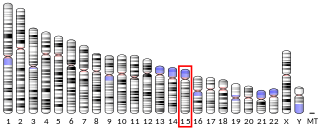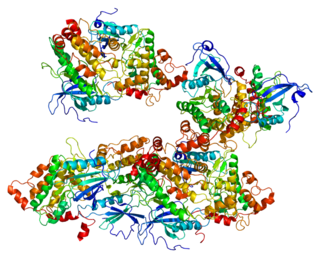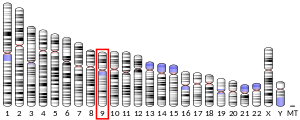
Cyclic AMP-dependent transcription factor ATF-1 is a protein that in humans is encoded by the ATF1 gene.

Mitogen-activated protein kinase kinase kinase 11 is an enzyme that in humans is encoded by the MAP3K11 gene.

Serine/threonine-protein kinase Sgk3 is an enzyme that in humans is encoded by the SGK3 gene.

Nuclear inhibitor of protein phosphatase 1 is an enzyme that in humans is encoded by the PPP1R8 gene.

Cell division cycle 7-related protein kinase is an enzyme that in humans is encoded by the CDC7 gene. The Cdc7 kinase is involved in regulation of the cell cycle at the point of chromosomal DNA replication. The gene CDC7 appears to be conserved throughout eukaryotic evolution; this means that most eukaryotic cells have the Cdc7 kinase protein.

Mitogen-activated protein kinase 12 is an enzyme that in humans is encoded by the MAP3K12 gene.

LUC7 like 3 pre-mRNA splicing factor (LUC7L3), also known as Cisplatin resistance-associated overexpressed protein, or CROP, is a human gene.

Death-associated protein kinase 3 is an enzyme that in humans is encoded by the DAPK3 gene.

Serine/threonine-protein kinase PLK2 is an enzyme that in humans is encoded by the PLK2 gene.

Fas-activated serine/threonine kinase is an enzyme that in humans is encoded by the FASTK gene.

SNF-related serine/threonine-protein kinase is an enzyme that in humans is encoded by the SNRK gene.

Apoptosis facilitator Bcl-2-like protein 14 is a protein that in humans is encoded by the BCL2L14 gene.

Leucine-rich repeat serine/threonine-protein kinase 1 is an enzyme that in humans is encoded by the LRRK1 gene.

Death-associated protein kinase 2 is an enzyme that in humans is encoded by the DAPK2 gene.

Mitogen-activated protein kinase kinase kinase 9 is an enzyme that in humans is encoded by the MAP3K9 gene.

Serine/threonine-protein kinase SIK1 is an enzyme that in humans is encoded by the SIK1 gene.

Serine/threonine-protein kinase VRK2 is an enzyme that in humans is encoded by the VRK2 gene.

Mitogen-activated protein kinase kinase kinase 13 is an enzyme that in humans is encoded by the MAP3K13 gene.

In molecular biology, members of the KIN2/PAR-1/MARK kinase family of proteins are kinases that are conserved from yeast to human and share the same domain organisation: an N-terminal kinase domain and a C-terminal kinase associated domain 1 (KA1). Some members of this family also contain an UBA domain. Members of this kinase family are involved in various biological processes such as cell polarity, cell cycle control, intracellular signalling, microtubule stability and protein stability. The function of the KA1 domain is not yet known.

Serine/threonine kinase 17a is a protein that in humans is encoded by the STK17A gene.





















